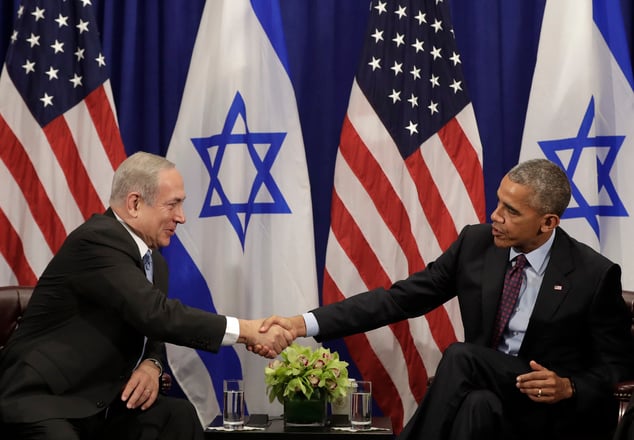Israeli Prime Minister Benjamin Netanyahu and US President Barack Obama met on the sidelines of the UN General Assembly and, while awkward at times, together portrayed a sense of closure in their oft-tense relationship.
Setting aside years of tensions, President Barack Obama and Israeli Prime Minister Benjamin Netanyahu bid each other farewell Wednesday with a strident affirmation of security ties between their nations and little public talk of their persistent differences over Iran, Israeli settlements and the Palestinians.
The two leaders sat down in New York in what the White House said was likely their last meeting before Obama’s presidency ends in January. Rather than delve into fraught debate about relaunching moribund peace talks, they cracked jokes about golfing together and future vacations devoid of stuffy meetings between heads of state.
Obama made only a passing reference to his opposition to the uptick in Israeli “settlement” construction in “occupied lands” as reporters were allowed in briefly for the start of the meeting.
“We do have concerns around settlement activity,” Obama said, adding that the US wanted to help Israel pursue peace. And that was that.
‘Profound US Concerns on Settlements’
In private, Obama was more pointed, senior Obama administration officials said, and raised “profound US concerns” that “settlement-building” was eroding prospects for peace. Netanyahu challenged that notion, said one official, adding that the two leaders had not papered over their differences.
Netanyahu’s ardent opposition to Obama’s nuclear deal with Iran did not come up, said the officials, who briefed reporters on the meeting on condition of anonymity. They said the meeting lasted about half an hour.
The move by both leaders not to air their differences in public reflected their common understanding that if a breakthrough on Mideast peace is to occur, it won’t be while Obama is still president. Following previous failed attempts to broker peace, the Obama administration has opted against a new major diplomatic push.
That means the focus shifts in the US to Obama’s potential successors: Democrat Hillary Clinton and Republican Donald Trump. Both would face similar obstacles if they sought to pick up where Obama left off, although Trump has insisted his administration would be anything but business as usual. Meanwhile, both Russia and France have signaled an interest in taking on a larger role in mediating between Israelis and Palestinians.
Still, Obama hasn’t ruled out the possibility that, in his final months in office, he’ll seek to influence the future debate by laying out what he sees as the contours of any viable deal. That could come in the form of a major speech or a US-backed U.N. Security Council resolution — both moves that would increase pressure on Israel and that Netanyahu would be expected to oppose.
White House officials said Obama wasn’t actively planning such a move but would consider it if it appeared likely to influence the situation positively.
Both Leaders Tout Military Aid Deal
In public, Obama and Netanyahu spent most of their time touting a 10-year military assistance deal their countries struck this month worth $38 billion, the largest tranche of military aid the US has ever given another country. The White House is hoping the unprecedented aid will curb the perception among Israel’s supporters that Obama has been insufficiently supportive of Israel’s security
“It is a very dangerous and difficult time in the Middle East, and we want to make sure that Israel has the full capabilities it needs in order to keep the Israeli people safe,” Obama said.
“Your influential voice will be heard for many decades, and I know you’ll continue to support Israel’s right to defend itself and its right to thrive as a Jewish state,” Netanyahu responded.
Ties between the two leaders have been tense ever since their first meeting as leaders in 2009 when Obama made clear he would seek to distance the US from Israel in a (failed and misguided) attempt to better relations with the Arab world.
By: AP and United with Israel Staff.
Do You Love Israel? Make a Donation - Show Your Support!
Donate to vital charities that help protect Israeli citizens and inspire millions around the world to support Israel too!
Now more than ever, Israel needs your help to fight and win the war -- including on the battlefield of public opinion.
Antisemitism, anti-Israel bias and boycotts are out of control. Israel's enemies are inciting terror and violence against innocent Israelis and Jews around the world. Help us fight back!
